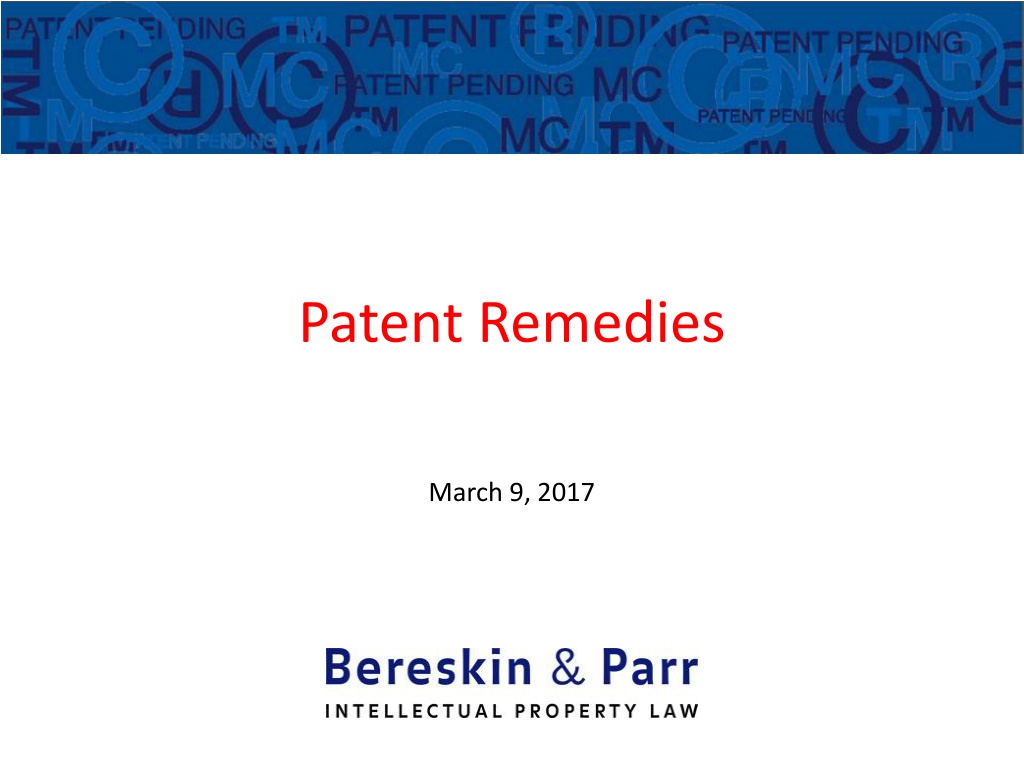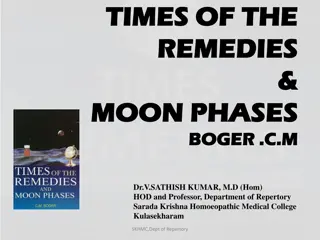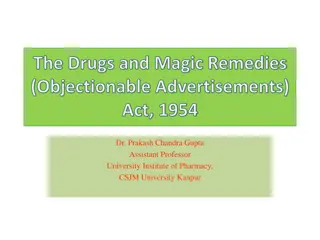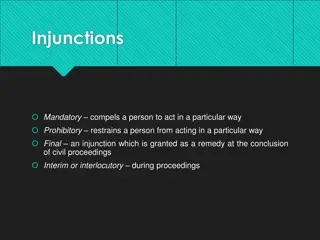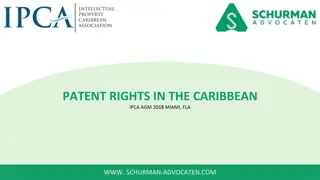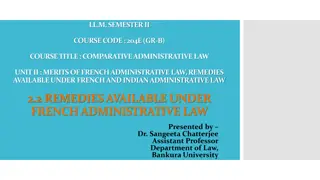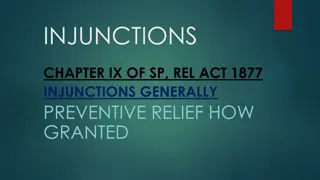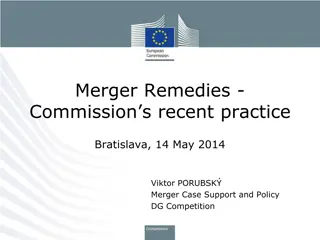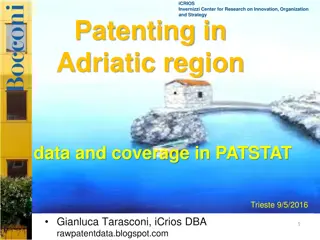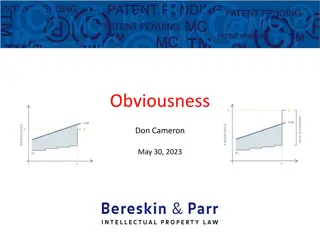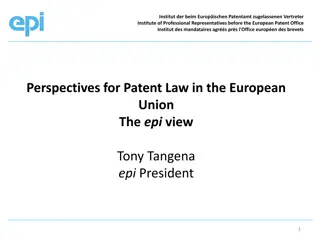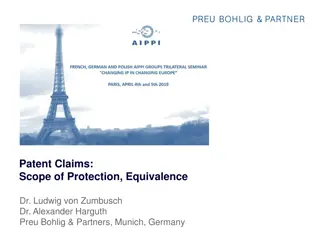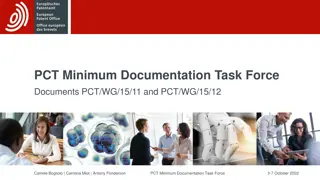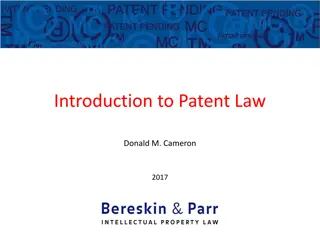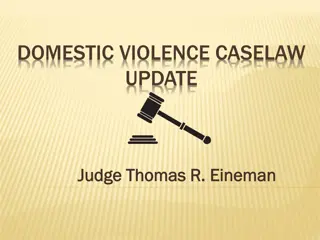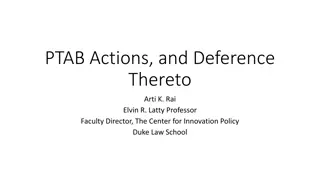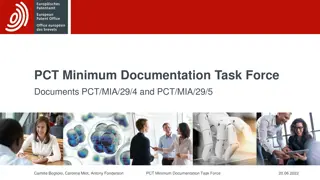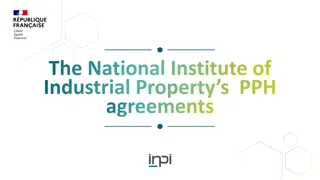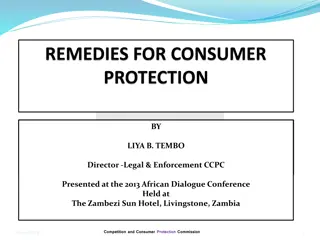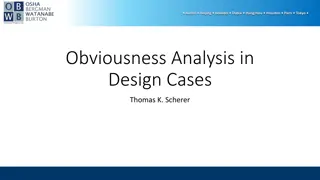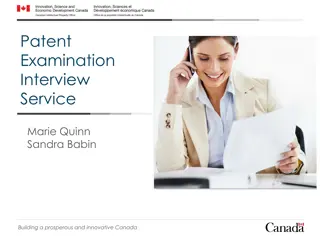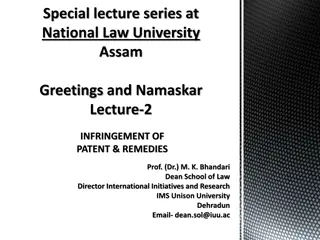Patent Remedies and Injunctions Overview
Understanding patent remedies including declaration of validity, infringement, injunctions, damages, and exclusive rights granted under the law. Discusses the types of relief sought, interim and permanent injunctions, factors considered for granting injunctions, and the concept of irreparable harm in patent cases.
Download Presentation

Please find below an Image/Link to download the presentation.
The content on the website is provided AS IS for your information and personal use only. It may not be sold, licensed, or shared on other websites without obtaining consent from the author.If you encounter any issues during the download, it is possible that the publisher has removed the file from their server.
You are allowed to download the files provided on this website for personal or commercial use, subject to the condition that they are used lawfully. All files are the property of their respective owners.
The content on the website is provided AS IS for your information and personal use only. It may not be sold, licensed, or shared on other websites without obtaining consent from the author.
E N D
Presentation Transcript
Patent Remedies March 9, 2017 Donald M. Cameron
Relief Typically Sought Declaration as to Validity Infringement Injunction Damages, or Accounting of profits Delivery up or destruction Costs Interest
The Exclusive Right Section 42 42. Every patent granted under this Act shall contain the title or name of the invention, with a reference to the specification, and shall, subject to this Act, grant to the patentee and the patentee s legal representatives for the term of the patent, from the granting of the patent, the exclusive right, privilege and liberty of making, constructing and using the invention and selling it to others to be used, subject to adjudication in respect thereof before any court of competent jurisdiction.
Injunction Interim, interlocutory and permanent Equitable relief Interim injunction short-term Interlocutory injunction until trial Permanent injunction post-trial, until expiry of patent rights
Interim and Interlocutory Injunctions Per SCC in RJR MacDonald v. Canada (1994), a 3 part test Serious issue to be tried Irreparable harm to party seeking relief if injunction is not granted Balance of convenience / inconvenience favours the party seeking relief
Irreparable Harm Of the three parts, this is the crux A very high hurdle Evidence of irreparable harm must not be speculative Must be proven Quantifiable effectively means not irreparable
Quia Timet Intended to prevent the irreparable harm from otherwise happening Imminent harm: a requirement? See Dableh v. Ontario Hydro, where the Court was persuaded that Dableh should not have to sit by and wait for the harm
Permanent Injunctions Not automatic Unilever v. Procter & Gamble injunction not granted, but generous but not confiscatory royalty granted instead
Damages Successful plaintiff / patentee entitled to damages under section 55(1) 55. (1) A person who infringes a patent is liable to the patentee and to all persons claiming under the patentee for all damage sustained by the patentee or by any such person, after the grant of the patent, by reason of the infringement. Person claiming under is typically a licensee Intended to place plaintiff in the same position as if there had not been the infringement Lost sales Lost royalties Plaintiff must prove damages suffered, and quantum
Damages Reasonable compensation Pre-issuance damages Section 55(2) 55. (2) A person is liable to pay reasonable compensation to a patentee and to all persons claiming under the patentee for any damage sustained by the patentee or by any of those persons by reason of any act on the part of that person, after the application for the patent became open to public inspectionunder section 10 and before the grant of the patent, that would have constituted an infringement of the patent if the patent had been granted on the day the application became open to public inspection under that section. Punitive damages Rare, see Imperial Oil v. Lubrizol
Profits Equitable relief Election damages, or an accounting of profits not both Election is itself equitable see Merck v. Apotex (2006 FCA 323) Profits earned by infringer must be causally connected Apportionment
Delivery Up / Destruction Ordinary award to get one or the other Modification so as to be non-infringing?
Delay A bar, or a factor in equitable relief? Laches, acquiescence Permanent injunction Unilever v. Procter & Gamble Profits Merck v. Apotex
Interest & Costs Ordinary award to get interest and costs Pre- and post-judgment interest Costs increasingly fixed as opposed to be assessed as per tariff Settlement offers a costs factor?
